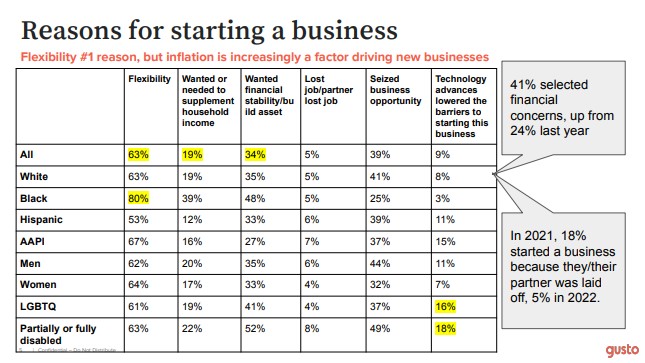Fueled by the COVID-19 pandemic and the historically high domestic unemployment rate that came with it, new businesses have increased by 42% since 2019, with 5 million new US businesses in 2022 alone.
In 2022, inflation, not unemployment, drove new business creation — and also impacted systemic services in place to help new business owners.
Silicon Valley Bank, which offered services and financial options specifically for startup entrepreneurs, collapsed in March. While its clients were able to recover their funds, it — as well as other now-defunct services like the fintech platform Assure — remains a major loss. Firms like Project Scaleup now work to fill the gap, for which Szijarto sees a silver lining.
“This unfortunate climate has made it more difficult for smaller investors and angel investors to participate,” Szijarto told Technical.ly. “The good side is that a lot more people who may have been considering becoming entrepreneurs are taking the leap, and I have more opportunities to coach founders.”
By the numbers
These entrepreneurs, according to Gusto’s 2023 New Business Survey of 1,590 people who launched businesses in 2022, include a surge of woman founders and founders of color, despite these groups being largely shut out by capital investments.

(Screenshot by Technical.ly)
While the 2023 percentages of businesses owned by women, Black and Hispanic founders dropped a bit compared to 2022, the numbers are notably higher compared to 2019 — especially for women.
- Women founded just 29% of new businesses in 2019; they founded 49% and 47% in 2022 and 2023, respectively.
- Black founders represented only 3% of new business owners in 2019. In 2022, the percentage went up to 9%, with a backslide in 2023 to 5%.
- Hispanic founders constituted 8% of new business owners in 2019. That number rose to 10% in 2022 and fell back to 8% in 2023.
- AAPI founders actually saw a drop in 2022, from 12% in 2019 to 9%; but they are one demographic that had a surveyed increase in 2023, up to 14%.
- Men, who founded 71% of new businesses in 2019, founded 53% of new businesses in 2023, up from 49% in 2022. The percentage of white founders similarly dropped from 78% in 2019 to 69% in 2022 and 2023, as more businesses by people of color were launched.
The dip in numbers for most groups reflects the challenges faced by new founders in 2022 and into 2023.
Economic challenges
“The market is more constrained than before we entered the market,” said Zero Cho, cofounder of Iago, a language-learning platform that interacts with streaming platforms like Netflix. “Funders are more willing to wait until later rounds instead of funding risky, early-stage startups. It makes entering a less-mainstream market a bit harder than what we were expecting.”
Inflation-related challenges also impact founders in their personal lives, making it harder to start and run a business.
“I’ve seen the most impact of inflation in childcare costs and daycare availability, which means I’m facing limitations on how much time I can work,” Szijarto said. “I have a toddler. Already underpaid childcare providers and teachers can no longer afford to be underpaid with this type of inflation, so they’re taking higher-paying jobs that may have nothing to do with early childhood education. So instead of allocating more hours to start-ups, I have to prioritize time with my consulting business, which pays the bills.”
Still, “flexibility” is by far the most frequently cited reason for starting a business in the most recent survey, with 63% of all founders saying it was their top reason. Beyond flexibility, however, the survey shows the economic climate’s impact on business creation: In 2022, 18% of new business owners cited a layoff as a reason, and that number dropped to 5% in 2023. But the number of business owners who cited “financial concerns” in 2023 was 41% compared to 24% in 2022.

(Screenshot by Technical.ly)
Even with financial concerns consuming many people’s attention this year, nearly half of the new 2023 business owners surveyed (49%) quit a job to start their business. Only a few of those quit because the job required them to return to the office — instead, 46% of business owners aged 35-54 who quit their jobs cited burnout.

(Screenshot by Technical.ly)
Entrepreneurship and economic uncertainty
The recently surveyed new business owners are somewhat concerned about the economy’s trajectory (36%), with fewer than half (48%) taking steps to prevent an economic downturn.
30% have increased their cash reserves, while 9% reduced investment in the business and 10% hired fewer staff members.
Cho falls into that 10%.
“We’re focusing on extending the runway,” he said. “We specifically chose not to hire last year because we know raising would not be an easy task in these conditions, and we vet all vendors carefully and sometimes opt to build things in-house if we can skip the subscription fees — even if that takes a bit more time from us.”
Join the conversation!
Find news, events, jobs and people who share your interests on Technical.ly's open community Slack

Delaware daily roundup: Delmarva Power vendor stats; DelDOT's $15M federal grant; 50 best companies to work for

Delaware daily roundup: Over 4,000 Black-owned businesses uncovered; Dover makes rising cities list; a push for online sports betting

Philly daily roundup: East Market coworking; Temple's $2.5M engineering donation; WITS spring summit


